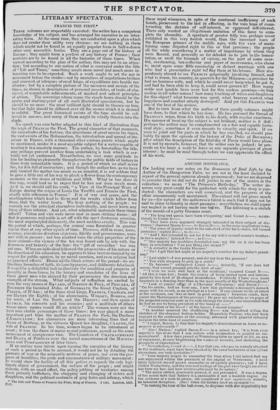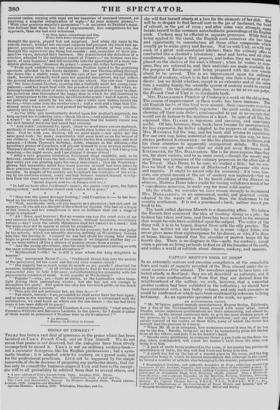AMENDE HONORABLE. -
ON' looking over our notes on the Romances of Real Life, by the Author of the Hungarian Tales, we are not in the least inclined to repent of the general opinion already pronounced ; but we are disposed to consider that we did not do full justice to one of the stories in the collection : we mean "The Princess's Birth-day." The writer de- serves very great credit for the perfection with which the story is con- ducted : the characters are well conceived, and the progress of the affair uncommonly well maintained. The extract will not prove much for us—the nature of the authoress's talent is such that it may not be said to shine brilliantly in short passages : nevertheless, we shall repair our neglect in not having made one beLtsre. The following is a sketch of the morals of a petty having court.
" The king and queen have been whispering,' said Count A—, myste- riously to Count B—.
" They have even appeared strangely interested in their subject of dis-; course,' observed Baron C—, to Baron D—, in the same implicatory tone. " The place of deputy-usher to the sub-clerk of the back-stairs, fell vacant yesterday,' replied to A—.
" And I had intended to ask for it for my wife's second cousin's brother- in-law's nephew,' faltered D—, to C—.
" Her majesty has doubtless forestalled you : my life on it she has been busy in solicitation ! Was any thing else vacant ?' "'A cornetcy in the Gotha Hussars' " No ! I got that last night at his majesty's coucher for my tailor's grand- son' " Last night ?—I was present, and did not hear the promise.'
" You were stooping to pick up a comb.'
" By heavens !' exclaimed Count A—, inwardly, `if one does but sneeze, that cursed graspall gets the start of one.'
" I wish we were well back at the residence,' resumed Count B—. All this is time lost ; beside the misery of being smiled upon and interro- gated by this herd of ill-shaped dromedaries. Positively I have seen more tournure in a dancing-bear than in the most courtly of the Westerburghians.' " Look at yonder effigy of a Chevalier d'Honneur,' said Baron C—. ' On his entree, half an hour ago, I saw him perforate a dowager's damask saque with his sword, in an attempt at a bow ! If one chance to die of ennui at the residence, one dies at least in good company ! Gracious saints, here comes the Montesquieu of the province ! He gave me verbatim svien pages of his projected criminal code as we rode through the forest ; and insinuated that he had an eye to being president of the board of —.'
" President of the bored ? of the borers, I should imagine.'
"In another moment the shuddering B— was transfixed within the clutches of the eloquent button-holder. Meanwhile Paulina, who had been engaged in the ceremonies of the evening, advanced with graceful urbanity towards the little knot of courtiers.
" I regret, Baron, to find that his Majesty's determination to leave us to- morrow is irrevocable ?'
" Alas! Madam,' replied Baron C— in a minor key, ` it is from your majesty's lips alone that I can endure with resignation so painful an an- nouncement. A few days passed at Westerburg form an epoch of life,, an mut of enjoyment, at once brightening the wastes of memory, and darkening the prospects of expectation' " Nevertheless, Count A—, I fear that you, who are so warmly attached to the residence, must have been shocked by the rural barbarism of our slvan excursions, our rude festivities ? '
" Your majesty deigns to remember the time when I did indeed find my sole enjoyment within the precincts of the capital of Westerania. I have lately believed myself grown insensible to all earthly pleasures ; but I have visited Westerburg, and the renewed feelings of the past have taught me where has been my loss, and how irretrievable must be its nature' " The queen smiled, graciously pleased, if not persuaded. It was a dogma of her moral faith that flattery is a pardonable if not a laudable engine. As the evidence of a wish to please, she considered it une supercherie aimable, an innocent deception. Alas! when did flattery need an apologist ?— !` la making the tour of the ball-room, to dispense with due impartiality her
coveted smiles, varying with regal art her inquiries of assumed interest, yet receiving a singular reduplication of reply—' As your majesty pleases,'- ` With your gracious majesty's permission '—it occurred to Paulina's sensi- tive feelings that there. was less of empressement, less competition for her approach, than she had ever witnessed.
" So Dian fades, subordinate and dim,
When Sol's fierce triumph shines,"
thought the queen, piqued but not surprised. And when she came to the remote corner, whither her recreant subjects had pursued the timid heir ap- parent, pouring into his ears her own accustomed tribute of base coin, she thought the supercherie anything but aimable ; and, conscious of their pro- spective views, detested their baseness. She remembered the definition of a courtier, afforded by the malignant regent of France ;—' un homme sans hu- mour, et sans honneur,' and fell insensibly into the apostrophe of a more cre- ditable philosopher, ' Jeunesse du prince !—source des belles fortunes ! '4*
" From such embittering contemplations Paulina turned to the gratifying spectacle afforded by her lovely daughter. She saw Theresa sailing through the dance like a stately swan, while the eyes of her partner Count Helden- stadt, however intensely fixed upon her graceful movements, did but reflect the general admiration of which she was the object. She saw that limber elf,' the fairy-footed Elschen, sporting like a butterfly amid her young com- panions,—and her heart beat with the proudest of pleasures. But when, re- turning towards the chair of state in which she had planted her royal brother, she perceived that throughout the happy doze in which he still contrived to nod, keeping time to the orchestra, he retained the gentle 1 and of Agneta, who sat patiently and silently by his side,—like a white rose hidden amidst the bushes,—tears came into the mother's eyes ; and a wish and a hope that Fer- dinand might learn to love and protect her helpless child, sprang simulta- neously into her heart ! " As the little girl involuntarily started upon her mother's approach, the king opened his wondering eyes,—shook his ears,—and apologized. Ile was a weary 1 ' he said; and Paulina felt conscious that his homely excuse was the first faithful word she had heard that evening. " And sister,' continued he, apart, since we must leave you ere daybreak, methinks it were as well that I retired ; I could sleep better on my pillow than here. God he with you, Paulina, till we meet again ;—nor spare me the same good wish ; for many inquietudes will soon beset us on the hehoof of our children. In a few weeks my son departs for his first campaign; and next autumn,—I think Theresa's birthday, sister, chances in the autumn,—the hereditary prince of Casselaria will present himself to your anxious scrutiny. Theresa's destiny will then be decided ;—and as to Agneta,—but I keep you standing,—the night wears, and I am fatigue it flornzir debout.' " After a very gracious salutation, Ferdinand crept stealthily, and, as be believed, unobserved from the hall-room. He felt or feigned unconsciousness that every eye was gloating upon his every movement ; that the Westerbur- ghians had accurately noted how many pinches of snuff had been taken by their gracious liege—how many times a sneeze had discomposed the royal muscles. In despite of his anxiety not to disturb the festivities of the even- ing by his cautious retreat, every one had become wearied beyond descrip- tion from the exact moment of his last irrepressible yawn-
" Quaud Auguste avoit bu—la Pologne aoit
" In half an hour after Ferdinand's sauv6e, the guests were gone, the lights extinguished, ' and slumber closed each leaden lid in peace.'
" How was the queen dowager looking; said Countess A— to her hus- band on his return from the residence.
" • Well, excellently well,—;if you inquire as a physician ; but sick past all surgery,—if you ask as a disciple of the school for scandal. She had on a toque of last season, and her complexion is now so ,brilliant that not a tinge of rouge is required' " Ah I Dieu, quel horreur ! But no woman can run the cruel risks of air and exercise which Paulina affects to brave, without bethming revoltingly robust ;—nay ! even the saintly Maintenon kept her turkeys in a mask ! And the king—how did he appear to relish his reception ?'
" ' His majesty's appearances are little to the purpose; but if we may judge by his actions, which are tolerably decisive, nothing in Westerburg became him like the leaving it. I suspect he was half afraid his young bear would begin to growl amicably to one of his cousins if we lingered another day ;- for we were rattled off like a shower of pumice-stones from a crater' " ' And the young adventurer, who has made his appearance among us with the same volcanic brilliancy and abruptness ?'
" Heldenstadt ?—Oh ! he is still a man whom the king delighteth to honour' " Yes,' interposed Baron C—, Ferdinand thrust him into the society of the princesses, till the court and the city were wonder-struck' " His majesty has as much usage du monde as my poodle !' observed the countess, indignantly. At all events I rejoice to find he has not renewed his engouement pour la belle belle-scour, notwithstanding his sympathy with her pococurante coldness of mind. Is she popular at Westerburg?' " ' Popular ?—why, yes,—faute de mieux, as the Laplanders value lamp- light during their peremptory winter ; but she has not wit enough to strengthen her party. Her queen bee-ship has too much pride, or too much indolence to gather a swarm.
" Then you did not patronize her, my dear A— ?' " Not much, indeed,—I am persuaded we shall never have her here again ; and as soon as the marriage of the hereditary prince is solemnized with the archduchess, we shall know on which side the sun shines :—for the last three years it has been difficult to guess' " I cannot imagine,' observed Countess A—, musingly, what attaches Countess d'Olredo and Baroness Laudohn to the queen; for I doubt if either of them would be pensioned if Paulina were to die to-morrow !' "
* La Bntyere.
f aluvres de FnWrie le Grand.



















 Previous page
Previous page